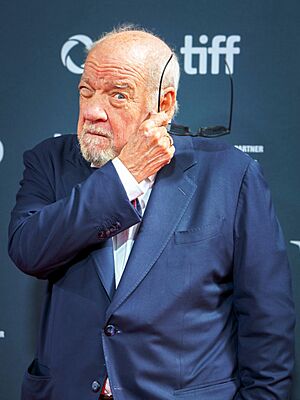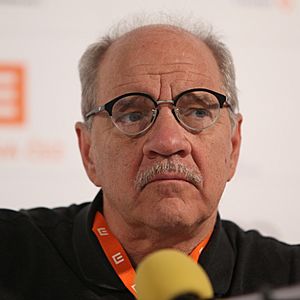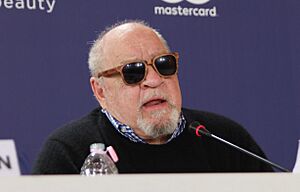Paul Schrader facts for kids
Quick facts for kids
Paul Schrader
|
|
|---|---|

Schrader in 2024
|
|
| Born |
Paul Joseph Schrader
July 22, 1946 Grand Rapids, Michigan, U.S.
|
| Education |
|
| Occupation |
|
| Years active | 1974–present |
| Spouse(s) | |
| Children | 2 |
| Relatives | Leonard Schrader (brother) |
| Awards | Laurel Award for Screenwriting Achievement AFI Franklin J. Schaffner Award Venice Film Festival Golden Lion |
Paul Joseph Schrader (born July 22, 1946) is an American screenwriter, film director, and film critic. He is famous for writing the script for Martin Scorsese's movie Taxi Driver (1976). He also worked with Scorsese on other films like Raging Bull (1980) and The Last Temptation of Christ (1988).
Schrader has directed many movies himself, including Blue Collar (1978), Mishima: A Life in Four Chapters (1985), and First Reformed (2017). For First Reformed, he was nominated for an Academy Award for Best Original Screenplay. His films often show lonely, troubled men dealing with big life questions.
Paul Schrader grew up in a very strict family. He didn't see a movie until he was 17 years old! He studied at Calvin College and then learned about film at UCLA. He started as a film critic, writing a book called Transcendental Style in Film (1972). In 1974, he began writing movie scripts.
Contents
Early life and education
Paul Schrader was born in Grand Rapids, Michigan. His family was part of the Christian Reformed Church, which has strict rules. His mother's family came from the Netherlands, and his father's family came from Germany through Canada.
Because of his strict upbringing, Paul didn't watch any movies until he was 17. He once said that The Absent-Minded Professor was the first movie he saw, and he wasn't very impressed. Later, he saw Wild in the Country, which had a bigger impact on him. Schrader believes that not seeing movies as a child made him think about them more deeply, rather than just feeling emotional about them.
He earned a degree in philosophy from Calvin College. He thought about becoming a minister but decided against it. Then, a famous film critic named Pauline Kael encouraged him to study film at UCLA.
Schrader first worked as a film critic. He wrote for newspapers and magazines. In 1972, he published his book, Transcendental Style in Film: Ozu, Bresson, Dreyer. This book looked at how certain directors like Robert Bresson, Yasujirō Ozu, and Carl Theodor Dreyer used a special quiet style in their films. He also admired directors like John Ford and Alfred Hitchcock. He called Jean Renoir's The Rules of the Game a "quintessential movie" that showed everything cinema could be.
Film career highlights
In 1974, Paul Schrader and his brother Leonard Schrader wrote a script called The Yakuza. It was about the Japanese crime world. This script was very popular and sold for a lot of money. The film was directed by Sydney Pollack and starred Robert Mitchum. Even though The Yakuza didn't make a lot of money, it helped Schrader get noticed by new directors in Hollywood.
In 1975, he wrote Obsession for director Brian De Palma. He also wrote early versions of scripts for famous directors like Steven Spielberg (for Close Encounters of the Third Kind) and for Rolling Thunder.
His script about a lonely New York City taxi driver became the famous film Taxi Driver (1976), directed by Martin Scorsese. This movie was nominated for an Oscar for Best Picture and won the top prize at the Cannes Film Festival. Schrader continued to work with Scorsese, writing or co-writing Raging Bull (1980), The Last Temptation of Christ (1988), and Bringing Out the Dead (1999).
Directing his own films
Because Taxi Driver was so successful, Schrader was able to direct his first movie, Blue Collar (1978). He wrote it with his brother Leonard. The film starred Richard Pryor, Harvey Keitel, and Yaphet Kotto as car factory workers who try to steal money. Making this film was difficult for Schrader because of disagreements with the actors.
In the 1980s, Paul Schrader directed films like Cat People (1982) and Mishima: A Life in Four Chapters (1985). Mishima was inspired by the Japanese writer Yukio Mishima. The film mixed parts of Mishima's life with scenes from his books. Mishima was also nominated for the top prize at the Cannes Film Festival. Francis Ford Coppola and George Lucas helped produce it. Schrader also directed Patty Hearst (1988), which was about the kidnapping of a rich heiress.
His films in the 1990s included The Comfort of Strangers (1990) and Light Sleeper (1992). Schrader said Light Sleeper was his "most personal" film. In 1997, he made Touch, based on a novel about a young man who can heal people. In 1998, Schrader received praise for the drama Affliction. This film is about a small-town policeman (Nick Nolte) trying to solve a hunting accident. Schrader won an award for his screenwriting at the Austin Film Festival that year. In 1999, he received the Laurel Award for Screenwriting Achievement from the Writers Guild of America.
In 2002, he directed Auto Focus, a movie about the life of actor Bob Crane. In 2003, Schrader directed a prequel to the horror film The Exorcist. However, the film companies didn't like his version, so they hired another director to reshoot almost the entire movie. This new version was called Exorcist: The Beginning (2004) and didn't do well. Schrader's original version was later released as Dominion: Prequel to the Exorcist (2005). Critics generally preferred Schrader's version.
After that, Schrader directed The Walker (2007) and Adam Resurrected (2008). In 2009, he received a Lifetime Achievement in Screenwriting award at the ScreenLit Festival in England.
In 2013, Schrader directed The Canyons. This film was special because it used Kickstarter to get money from many people online. It was made for a small budget and was released in a limited number of theaters.
In 2014, Schrader directed The Dying of the Light, an action movie starring Nicolas Cage. Schrader was not happy with the final version of this film because the producers changed it. He later re-edited it into a different version called Dark.
Schrader's drama First Reformed, starring Ethan Hawke, was released in 2017 and received great reviews. For this film, Schrader earned his first Academy Award nomination for Best Original Screenplay. In 2021, he directed The Card Counter, starring Oscar Isaac. This film also received good reviews. Schrader considers First Reformed, The Card Counter, and Master Gardener (2022) as a group of three related films. In 2022, Schrader received the Golden Lion Honorary Award at the Venice Film Festival for his amazing career.
In 2023, it was announced that Schrader would write and direct a new film called Oh, Canada, based on a novel by his friend Russell Banks. It will star Richard Gere.
Themes in his films
A common idea in Paul Schrader's films is a main character who is on a path that hurts themselves, either on purpose or without realizing it. Often, the story ends with the character finding some kind of hope or new beginning, but only after a difficult sacrifice.
Schrader has often called films like Taxi Driver, Light Sleeper, First Reformed, and The Card Counter "man in a room" stories. These films show a main character who is often isolated and dealing with their inner struggles.
Even though many of his films are based on real people's lives (like Raging Bull or Mishima), Schrader has said it can be hard to make biographical films because you sometimes have to change real events for the story.
Personal life
Paul Schrader is married to actress Mary Beth Hurt. They have two children, a daughter and a son.
Beliefs
Schrader is a Christian. He grew up in a strict Calvinist family but later explored other beliefs before returning to Christianity. He became an Episcopalian after his children were born and now attends a Presbyterian church. His films often explore religious ideas and themes.
Favorite films
In 2012 and 2022, Paul Schrader shared his list of favorite films for the Sight & Sound magazine polls. Here are some of the movies he loves:
- Citizen Kane (1941)
- The Conformist (1970)
- The Lady Eve (1941)
- Pickpocket (1959)
- The Rules of the Game (1939)
- Tokyo Story (1953)
- Vertigo (1958)
- The Wild Bunch (1969)
- Persona (1966)
- Metropolis (1927)
- The Godfather (1972)
Filmography (selected)
| Year | Title | Director | Writer | Notes |
|---|---|---|---|---|
| 1974 | The Yakuza | No | Yes | |
| 1976 | Taxi Driver | No | Yes | |
| Obsession | No | Yes | ||
| 1977 | Rolling Thunder | No | Yes | |
| 1978 | Blue Collar | Yes | Yes | |
| 1979 | Old Boyfriends | No | Yes | Also executive producer |
| 1980 | American ... | Yes | Yes | |
| Raging Bull | No | Yes | ||
| 1982 | Cat People | Yes | Uncredited | |
| 1985 | Mishima: A Life in Four Chapters | Yes | Yes | |
| 1986 | The Mosquito Coast | No | Yes | |
| 1987 | Light of Day | Yes | Yes | |
| 1988 | Patty Hearst | Yes | No | |
| The Last Temptation of Christ | No | Yes | ||
| 1990 | The Comfort of Strangers | Yes | No | |
| 1992 | Light Sleeper | Yes | Yes | |
| 1994 | Witch Hunt | Yes | No | TV movie |
| 1995 | New Blue | Yes | Yes | Documentary short |
| 1996 | City Hall | No | Yes | |
| 1997 | Touch | Yes | Yes | |
| Affliction | Yes | Yes | ||
| 1999 | Forever Mine | Yes | Yes | |
| Bringing Out the Dead | No | Yes | ||
| 2002 | Auto Focus | Yes | No | |
| 2004 | Suspect Zero | No | Uncredited | |
| 2005 | Dominion: Prequel to the Exorcist | Yes | No | |
| 2007 | The Walker | Yes | Yes | |
| 2008 | Adam Resurrected | Yes | No | |
| 2013 | The Canyons | Yes | No | |
| 2014 | Dying of the Light | Yes | Yes | |
| 2016 | Dog Eat Dog | Yes | No | Role: Grecco The Greek |
| 2017 | First Reformed | Yes | Yes | Nominated- Academy Award for Best Original Screenplay |
| 2021 | The Card Counter | Yes | Yes | |
| 2022 | There Are No Saints | No | Yes | Also executive producer |
| Master Gardener | Yes | Yes | ||
| 2024 | Oh, Canada | Yes | Yes |
Awards and recognition
Paul Schrader has won many awards throughout his career for his writing and directing. Some of his notable awards include:
- Cannes Film Festival, Best Artistic Film Contribution for Mishima: A Life in Four Chapters (1985)
- Writers Guild of America, Laurel Award for Screen Writing Achievement (1999)
- American Film Institute, Franklin J. Schaffner Award (2005)
- Gotham Independent Film Award, Best Screenplay for First Reformed (2018)
- Venice Film Festival, Golden Lion Honorary Award (2022)
He has also been nominated for many awards, including an Academy Award for First Reformed in 2019.
See also
 In Spanish: Paul Schrader para niños
In Spanish: Paul Schrader para niños
 | Laphonza Butler |
 | Daisy Bates |
 | Elizabeth Piper Ensley |



